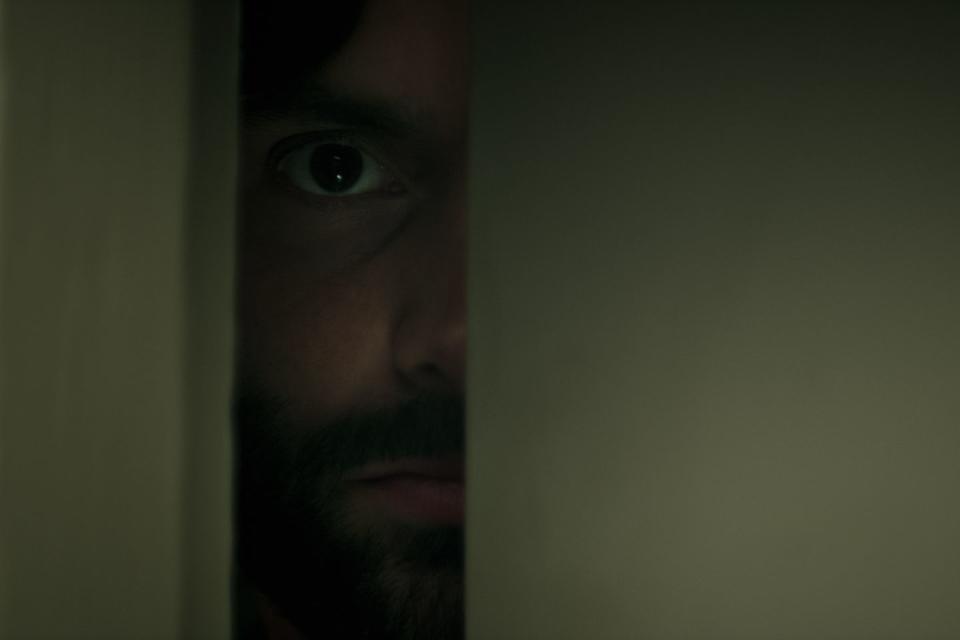What 'You' Season 4 Gets Right And Wrong About Erotomania, Joe's Delusional Disorder

Fictional serial killer Joe Goldberg (played by Penn Badgley) from Netflix’s You is back to wreak havoc for a fourth time around.
This time, Joe—I mean, Jonathan Moore—has crossed the Atlantic to try to reconnect with his love interest from season three, Marianne (played by Tati Gabrielle). In the meantime, however, he’s passing the days working as an English professor at a prestigious London university and spending copious amounts of time with some, uh, very interesting members of the British elite. Oh, and did I mention he also falls for someone new? (But, let’s be honest, is anyone surprised?)
Long-time fans of You know that the series’ protagonist is known for falling into deep obsessions with different women, which have often led him to stalk and commit violence—even murder—against his romantic interests. In the fourth and latest season, viewers finally learn that a mental health condition is driving Joe’s obsessions: erotomania.
Erotomania, also known as de Clérambault's Syndrome, is the psychotic belief that one is loved by another person despite overwhelming evidence to the contrary, says J. Reid Meloy, PhD, a board-certified forensic psychologist and FBI consultant who has extensively studied violent forms of the disorder.
Classically, individuals with erotomania fixate on someone of a higher social status, usually a stranger, as the object of their affection. This could be a celebrity, influencer, a boss at work, or simply someone of a higher socioeconomic status, adds Justin Faden, DO, an associate professor of psychiatry at the Lewis Katz School of Medicine at Temple University, who has also studied erotomania and has worked with patients with the mental health condition. Oftentimes, the obsession “is confined to one person or one person at a time,” he explains.
Meet the Experts:
J. Reid Meloy, PhD, is a board-certified forensic psychologist and consultant for the FBI Behavioral Analysis Unit.
Justin Faden, DO, is an associate professor of psychiatry at the Lewis Katz School of Medicine at Temple University.
Erotomania is a subtype of delusional disorder, says Faden. And while it is a serious mental illness that may be potentially harmful for the love interests of those with the disorder, it’s a relatively rare condition with a lifetime prevalence of only 0.2%, according to a study authored by Faden et al.

So, what are some common markers of those with this rare condition? How does erotomania affect someone’s perception of the world? And what does You get right about the delusional disorder—and what’s simply a “made for TV” dramatization?
Ahead, the experts answer all of these questions and more.
What are some common symptoms of erotomania?
In addition to the symptoms described above, erotomania can also completely warp a person’s worldview and perception of reality. For the individual with erotomania, “everything that the love interest does relates to them, i.e. wearing a certain item of clothing, posting something specific on social media, or even a song lyric or statement in an interview,” explains Faden.
They “grossly distort the perceived behaviors of the ‘loved one,’” adds Meloy. For those with this delusional disorder, actions that the love interest takes serve as proof of their love for them, even though it has no basis in reality. Think: Joe addressing all of his love interests as “you” before ever meeting them, as if they have a private intimate relationship that only the two of them are aware of. Or, him believing that his crushes are letting him in on an inside joke via their actions or social media posts, when they, in fact, are not.
Additionally, those with erotomania will spend countless hours researching the love interest to try to find clues or behaviors that support their perception, Faden adds. This may include: spending a disproportionate amount of time reading about this person, obsessing over their social media accounts, becoming a fixture in their life, or even mimicking and/or copying the individual. “This significant time expenditure can lead the impacted person to believe they have a close relationship with their love interest—they are the only one that truly understands them [and] can make them happy.” Ahem, ring any bells?
There are three stages of erotomania: hope, vexation, and grudge, says Faden. The grudge stage may be triggered if the person’s warped perception becomes shattered through unrequited love, i.e. the love interest marries someone else or directly refutes their advances, he explains. When an individual reaches this stage, troubling behaviors can begin to occur, such as stalking, threatening, harassing, theft, or even violent assault. These behaviors are usually directed towards the love interest, but can potentially be aimed at others who have sparked the feelings of jealousy, Faden explains. Sounds like someone familiar…

Lastly, apart from their delusions and the direct actions (and consequences) that can stem from them, people with erotomania can be high functioning with little day-to-day impairment, says Faden. “They can have normal interpersonal relationships with others, succeed financially or occupationally, and function appropriately,” he notes. “This contributes to the low diagnosis [as] they usually fly under the radar.” Think: The countless times Joe has gotten away with murder and the fact that, somehow, he’s always able to afford to fly across the country (and even overseas) to escape the scene of the crime.
Why do people develop erotomania?
Like many forms of mental illness, the exact cause of erotomania is unclear, but likely multifactorial.
Some believe that the origins are biological and related to structural brain abnormalities as well as dysfunctional neurotransmitters, such as dopamine and serotonin, while others believe the cause is more strongly related to feelings of shame and low self-esteem, likely as a result of trauma, explains Faden.
And while more studies have to be done around the relationship between social media and erotomania, it is true that delusional beliefs may be exacerbated by internet usage. “In human history, it has never been as easy to follow or monitor another individual as it is now,” says Faden. “With [people’s] actions constantly being followed, dissected, and discussed on social media and the internet, there is little true privacy.” And, well, that’s kind of terrifying, especially as it relates to one’s safety online and IRL.
So, what did You get right and wrong about erotomania?
Hold up! Before you keep reading, if you haven’t seen the second part of You season four yet, there are, uh, a couple of spoilers ahead. Don’t say I didn’t warn you.
Is it true that someone with erotomania would…
Kidnap a stranger they believe is in danger because they think they know what’s best for them and are able to protect them from said danger?
No.
In the fourth season of You, Joe is not the only character with erotomania. Viewers are introduced to another person with the condition: Dawn (played by Alison Pargeter), a photographer who has a deep obsession with British elite and influencer Lady Phoebe (played by Tilly Keeper). In episode six, Dawn kidnaps Phoebe and locks the two of them in a hotel room above Adam’s (played by Lukas Gage) exclusive London social club. She does this in order to “protect” Phoebe from the so-called “Eat the Rich” killer.

Well, according to Faden, kidnapping is a “stark exaggeration” of typically-exhibited beliefs and behaviors of those with erotomania. Although it’s true that an individual with erotomania may have a delusional belief that they know what’s best for their love interest, it rarely escalates to kidnapping, he says. “Aggression or acting out, in the context of erotomania, typically occurs as a last resort to garner attention or as revenge for a perceived slight, though it’s exceedingly rare.”
Believe they know a stranger intimately from what they’ve seen of them on social media and television?
Yes.
“This is a pitfall of the internet and social media,” says Faden.
In You season four, both Dawn and Joe believe themselves to be close friends with the objects of their admiration based on what they know about them through social media posts and interviews shared online. According to Faden, this is an accurate portrayal of erotomania.
People are routinely broadcasting all aspects of their lives, which allows individuals with erotomania to create a false or delusional narrative that they have a close relationship with their love interest through what they say, post, or do, explains Faden. “Over time, an individual can create an intimate relationship with carefully curated social media clips or television interviews.”
An extreme real-world example of this may be the case of 18-year-old Eric Rohan Justin, who, in early 2020, began stalking 15-year-old TikTok star Ava Majury on social media platforms. On July 10, 2022, Justin arrived at the Majury family home in Florida, traveling from Maryland, with a gun to confront Ava. By sunrise, his body lay dying, after being shot by Ava’s father, Rob Majury.
Create stories in their mind of things they’ve imagined they did together with a stranger?
Yes.
In episode six of You, Dawn is convinced that she and Lady Phoebe got matching tattoos together that say, “Soul Sister.” But, surprise surprise, that never happened.
This is often referred to as an “idea of reference” or “delusion of reference,” says Faden. “[This] roughly equates to an innocuous or coincidental event or action as having exaggerated meaning or importance to the individual, or believing that the action relates to them.” Some examples of delusions of reference include: tattoos, song lyrics, specific items of clothing, and social media posts. “The individual will see these [references] through a warped lens and believe it relates directly to them, and thus base their actions off of it,” he adds.
Faden explains that he once had a patient quit his job because a woman he was obsessing over made an offhand comment about a movie character—who happened to have an office job—she thought was “too feminine.” The patient took this to mean that having an office job made a man “feminine,” and thus she would not be romantically interested in him if he stayed at his current role.
Put a stranger in harm’s way out of their “love” for them?
No.
Well, it would at least be atypical, says Faden.
In episode six, in addition to kidnapping Phoebe, Dawn also pulls out a knife at one point in an attempt to give Phoebe an impromptu “Soul Sister” tattoo after she notices the Lady doesn’t, in fact, have one. While Dawn’s intent isn’t to kill Phoebe, she does put her in a dangerous situation. Joe acts similarly when he kidnaps and locks each of his love interests in the giant glass box to “protect” them because he “loves” them so much.

Nevertheless, Faden says this is a dramatization of the actions people with erotomania may take. “Typically, putting a love interest in harm’s way would be unexpected,” he says. It’s very important to note that violence in individuals with delusional disorders, such as schizophrenia and erotomania, is often exaggerated in the media, Faden adds. “Most individuals with mental illness are not violent and are just as likely, if not more, to be victims of assault as they are to perpetuate it.”
However, someone with erotomania may perhaps construct a scenario in their mind where they put their love in danger or at risk, so they can save them—as a means to ingratiate themselves or illustrate the “danger” the love interest is in without them, he explains.
Believe a stranger is sending them secret messages, intended only for them, through their social media posts, interviews and/or work?
Yes.
In one of the biggest twists in television history, episode eight of You reveals that the writer and politician that Joe develops a twisted relationship with, Rhys Montrose (played by Ed Speleers), isn’t actually the real Rhys. Let me explain: While Rhys Montrose is a real person, the Rhys that is portrayed to viewers is simply a figment of Joe’s imagination. Joe starts imagining interactions with Rhys after spending multiple hours a day poring over his memoir, deeply researching his social media, and watching his interviews.

And while hallucinating another person is not a common symptom of erotomania (more on that later), believing that someone is sending you cryptic messages through their social media posts and interviews—which Joe convinces himself is happening—is.
This goes back to the concept of “ideas of reference” and is something Faden has commonly observed in his patients. They will discuss song lyrics, social media posts, article headlines, and quotes they believe directly pertains to them, or things happening in the community they’re convinced are meant for them, such as a graffiti marking, he shares.
Stalk a stranger and their loved ones to get closer to them, taking note of the places they’ve visited?
Yes.
Any fan of You knows that Joe often stalks his love interests, so when he starts obsessing over “rags to riches” success story Rhys, it’s no surprise that he begins to show up at the Indian restaurant the real Rhys frequents—plus, other one-off events—to get closer to him.

“Stalking, in this regard, can help foster attachment and commonality with the loved one as they are now sharing something together—routines, activities, etc,” says Faden. “It also reinforces the narrative that ‘we have so much in common,’ strengthening the perceived relationship and distorted sense of reality.”

Unfortunately, social media has made stalking—both IRL and digitally—increasingly easy to do. For this reason, in Faden’s practice, they often advise psychiatry residents to refrain from geotagging their location in real time whenever possible and encourage them to have private social media profiles.
Cyberstalk a stranger and their loved ones to access more information about them?
Yes.
In addition to real life stalking, Joe also cyberstalks Rhys, which, according to Faden, is a common behavior those with erotomania may engage in. “The purpose of cyberstalking is, in part, seeking to gain more information about the loved one to further strengthen the perceived connection and relationship,” he explains.
Obsess over a stranger, in general?
Yes.
You probably get the gist by now, but Joe’s constant obsession over his love interests is, in fact, a symptom of erotomania.

Hallucinate a stranger despite never having met them IRL?
No.
While portraying hallucinations or visions of a person who’s not really in the same room as the protagonist makes for great television, Joe imagining real-life interactions with Rhys is actually not a symptom of erotomania.

“A distinguishing factor between erotomania and schizophrenia is the absence of hallucinations,” says Faden. “Visions to the extent described could potentially happen in someone with paranoid schizophrenia, however, not in someone with erotomania.” Plus, in general, visual hallucinations are rare in persons with mental illness—auditory hallucinations are more common, he adds.
Hallucinate or imagine text exchanges between themself and a stranger they never met?
Hallucinating, no. Imagining, yes, “provided there’s an understanding that it’s not actually taking place,” says Faden.
Faden explains that daydreaming or rehearsing a scenario in one’s mind can be a positive coping mechanism for those with erotomania, but hallucinating a conversation or text exchange would simply not typically occur in an individual with this delusional disorder.
So while the writers of Netflix’s You surely did their research on erotomania, it’s safe to say they took more than a few liberties in their portrayals of the condition on the show. Hey, it’s television after all.
You Might Also Like

